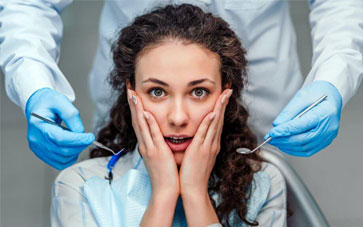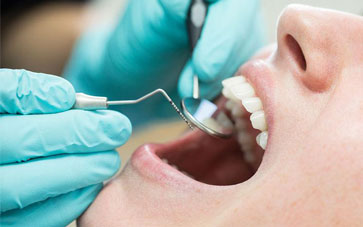
Do you have Dental Phobia ?
Dental phobia is a common problem among people of all ages. People are scared of dentists or have a fear of dentist needles. Dental phobia is a term used to describe fear, anxiety or stress for a dental sitting. The patient is scared to visit the dentist thus causing delay in the dental treatment.
It can be associated with certain triggers such as needles, drills or the noise of the dental equipment.
When dental anxiety is severe, it causes irrational fear and complete avoidance of going to the dentist, thus it can be classified as a dental phobia.
Signs and Symptoms of Dental Phobia
People with dental phobia may experience:
- sweating
- racing heartbeat (tachycardia) or palpitations
- low blood pressure and possible fainting (syncope)
- visible tremble, crying and distress
- delay appointments to avoid the treatment whether simple or complex
Causes of Dental Phobia:
Dental phobia can be experienced in people of any age.
Dental fears can be caused by:
- a traumatic dental experience or other healthcare experience
- any history of trauma to the head and neck
- generalized anxiety, depression or post-traumatic stress disorder
- the view that the mouth is a personal area and accessing the mouth is an invasion of personal space
- fear of loss of control/ having no say while the dentist is working in one’s mouth
- tooth extraction phobia
- trust issues
- anxiety associated with other conditions such as agoraphobia (fear of being in situations where you feel you cannot escape), claustrophobia (fear of closed spaces) or obsessive-compulsive disorder where there is an obsession around cleanliness can make access to dental care more difficult.
There can be certain types of Dental Phobia:
Most people with this phobia fear more than one element, while those with severe symptoms may fear with most of the elements simultaneously.
- The Dentist: Dentists are often irrationally mistaken as cold and sadistic at worst. Mostly if you have had a bad personal experience with a particular dentist before.
- Pain: Painless dentistry was difficult or impossible until today. Even today some procedures may involve a slight amount of pain. Many people are extremely sensitive to dental pain and fear that the pain may be excruciating.
- Numbness or Gagging: Some people particularly those who have experienced choking or difficulty in breathing are afraid of having their mouth numb with anesthesia. They worry that they might be unable to breathe or swallow.
- Sounds and Smells: Particularly those who have had previous bad experiences during dental treatment are afraid of the sound of the drills and the smell of teeth during treatment.
- Needles: If you have a needle phobia, you might be extremely afraid of the injections that dentists use to numb the mouth.
Dental phobia can affect your Oral Health
Avoiding the visit to your dentist can result in the worsening of dental problems. It may lead to greater need for emergency care or more complex treatment. It can also increase the underlying problem of dental anxiety. This is known as the ‘vicious cycle of dental anxiety’.
Regular 6 monthly dental check-ups, cleaning and screening X-rays can prevent dental disease and overcome dental phobia. Some dental clinics in Delhi offer counselling to their patients which helps them with their phobia.
Most dental disease is lifestyle-related and preventable. By avoiding dental treatment, you are missing out on learning how to better care for your oral health.
The lifestyle factors that lead to dental disease are very similar to those that lead to diabetes, obesity, heart disease, stroke and some cancers, so taking care of your oral and general health is very important.
Complications
Either due to genetics or lifestyle pattern, dental health varies dramatically from person to person. Some people visit their dentist regularly with little or no impact on their teeth or gums. While others who are prone to decay and gum disease, no matter how frequently they brush and floss don’t bother to get an oral check-up done because of the fear. If you are not one of the lucky few, dental phobias can have dire consequences on the health of your teeth and consequently psyche.
Tooth decay gets worse over time. Small cavities that once could have been easily filled can lead to broken and decayed teeth which could require expensive and invasive root canal therapy and reconstructive work. This knowledge can make you even less likely to seek treatment, creating a vicious cycle.
In the modern world, we are expected to have clean, healthy, shiny teeth. If your teeth get broken and rotten due to decay and neglect, you might experience social stigma. It may become more difficult to get a certain job and lack of confidence. Dating might be impacted and even your friends may start to talk. This can lead to isolation, depression, social anxiety and even social withdrawal.
In some cases, dental problems can cause infection. Failure to treat the infection could cause it to spread, causing medical illness as well, because your mouth is literally the gateway to your health.
Coping
If you have extreme dental phobia (severe and paralyzing) it is best to consult with a trained mental health professional or dentists for phobic patients before beginning the dental treatment. Cognitive-behavioural therapy, medications, and hypnosis5 can help you get your fear under control.
Once your phobia is at a manageable level, you will be able to visit the dentist comfortably. However, it is important to choose the right and best dentist in Delhi. Not all dentists use the same method and technique to assist patients with phobia.
It is always acceptable to schedule an initial consultation without a full examination and workup. When you call for the appointment, explain that you suffer from dental phobia and are not ready to book a full examination. This initial appointment will allow you to develop a rapport with the dentist and get used to their manner and demeanour.
As you progress for further appointments, remember that you are always in control. Work out a signal with your dentist that you can use when you need a break and a different signal to let the dentist know that you need more anaesthesia. Talk to your dentist about the availability of sedatives that will allow you to sleep through the dental procedure.
Many people like to play music on EarPods during their treatment. Some dentists offer these devices or even virtual reality systems. These items can distract you and help you relax.
Dental phobia is common and treatable. Untreated, however it can lead to a range of physical difficulties. See a mental health professional first to bring your phobia under control, and then search for a dentist that makes you feel comfortable. Finding a dentist that you fully trust is worth the effort.
Severe dental anxiety or phobia may require management with relative analgesia (happy gas), anxiety relieving medication, conscious sedation or general anaesthesia.
Relative analgesia (happy gas)
Known as happy gas or laughing gas, nitrous oxide can help people relax during dental treatment. A mask is fitted onto your face and you breathe a mixture of oxygen and nitrous oxide in controlled volume. It is effective within a few minutes and wears off easily.
You will feel relaxed but will still be awake. You can talk to the dentist, and hear what they say to you, but you won’t necessarily remember everything once the visit is over.
For most people, the relaxed sensation created by nitrous oxide sedation is very pleasant.
Anxiety relieving medication (oral anxiolytic tablets)
Oral anxiety relieving (anxiolytic) medications are sometimes prescribed by dentists or doctors to help anxious patients to relax. A short-acting, small, single dose is usually taken one hour before the dental appointment.
Medication should only be taken following discussion with your dentist or doctor. You will need someone to accompany you to and from the dental visit as you cannot safely drive a car while under the influence of anxiolytic medication.
Conscious sedation
This type of sedation involves receiving medication through a drip placed into a vein of the arm or hand. Intravenous (IV) sedation is provided by a dental seditionist (a dentist with advanced training in sedation) or an anaesthetist. It can be undertaken at a dental practice that has additional equipment.
Under IV sedation, patients are relaxed and may drift off into a light sleep, but they can respond to verbal prompts. Possible side effects include drowsiness and nausea after the procedure. Patients should not drive themselves home after intravenous sedation.
Not all dentists offer treatment under sedation. However the best dental clinic in South Delhi uses conscious sedation routinely for treating their anxious patients. Some pre-existing medical conditions or medications may affect the type of sedation you can have. Talk to your dentist for further information.
General anaesthesia
Treatment under a general anaesthetic is carried out in a hospital setup by the dentist and anaesthetist. General anaesthesia involves patients being ‘fully asleep’. Some possible side effects include nausea and a longer recovery time than other forms of sedation.
A general anaesthetic can be a good option for some people, but remember that it doesn’t help you learn coping strategies for anxiety or make it easy to see the dentist again.
You will need both pre- and post-operative visits to the dentist. The anaesthetist will also need to assess you prior to the general anaesthesia. Patients cannot drive themselves home after a general anaesthetic.
Some dental treatments are better provided over several visits. This means that your treatment options may be more limited if you want all your dental treatment under general anaesthesia. Some people need a lot of treatment and it may not be possible for them to get enough anaesthesia time to finish all the treatment in one session.
In some instances, having some dental treatment done on the dental chair before the general anaesthesia will help prepare the mouth for the treatment that will be provided, to make best use of the general anaesthetic session.
General anaesthesia works best when used in conjunction with other strategies, so that some treatments can be done without general anaesthesia. This way, general anaesthetic session time is kept for the treatments that are most difficult to cope with. This is a rare method, seldom used for dental treatment.
To book an appointment with us in, ‘Smile Delhi- The Dental Clinic’– call us on +91- 9811106871 or whatsapp Dr. Suprriya B Bhatia on +91-9811106377. You can also mail us on [email protected]
We Care To Make You Smile.
Posted by: Dr Hema































































